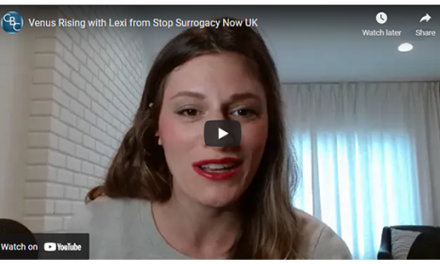- Egg Freezing and Egg Selling Carry Health and Medical Risks that Go Untold
- Most concerning is that to date, there has been no major peer-reviewed medical research on the long-term effects of egg harvesting on the health of the young women who provide their eggs. This makes it impossible for women to give true, meaningful, informed consent relative to the health and psychological risks involved.
- Without studying women who “donate” or freeze their eggs over the course of their lifetime, there is little empirical data on the risks these women have later in life with issues of their own fertility, developing cancers, psychological consequences of their decision, or any other negative impact egg “donation” or freezing had on their life.
- Of the medical complications that are known, they are rarely documented in the medical literature, as the individuals and organizations that are tasked with safety and oversight are also the ones who stand to profit from egg “donation” and freezing.
- Unlike those who donate organs or blood, there is no requirement to track these women in a central database. Once the extraction is over, the women are forgotten; no records or information about them or where their eggs went exists.
- The medical process required for egg retrieval is lengthy and there are known medical risks associated with each step. Risks include Ovarian Hyper Stimulation syndrome (OHSS) due to superovulation, loss of fertility, ovarian torsion, stroke, kidney disease, premature menopause, ovarian cysts, and in some rare cases, death.
- Lupron®, a drug commonly used in the first step of the egg “donation” and freezing process to stop ovarian function and medically induce menopause before hyperstimulation of the ovaries, is a synthetic hormone that is not approved by the FDA for use in fertility treatment. It has a Category X rating, which means if a woman gets pregnant while taking the drug, there will be harm to the developing fetus. This is extremely concerning for egg donors who are very fertile and may not adhere to instructions not to be sexually active during ovarian stimulation.
- Children born by “donor” eggs are either never told this important detail or have no way of knowing who their genetic mother is. The secrets around anonymous conception are troublesome to many, and only now are we seeing these people organize and demand access to this important and personal information.
- Egg freezing involves the same hormone treatments and egg retrieval process as “donation”.
- Women who freeze their eggs may feel falsely reassured about their future fertility. Success is not guaranteed: data on birth rates depend on age at freezing and the number of eggs retrieved. Emotional distress can arise if frozen eggs do not result in a successful pregnancy, leading to regret or a sense of failure.
- While egg quality is “frozen” in time, complications for pregnancy at an older age increase.
- Egg “donation” and freezing have no long-term studies evaluating long-term health outcomes (including fertility and certain types of cancer) of the woman who sells or freezes her eggs.
- Lack of Informed Consent
- Egg “donors” are recruited through ads in online classifieds, social media, and college newspapers, offering anywhere from $5,000 to $100,000. These ads rarely, if ever, make any mention of the potential health risks involved, nor do they reveal that no long-term studies have ever been conducted. Such information is essential for decision-making and consent to be truly and fully informed.
- Similarly, social media targets young women to postpone their biological clock by freezing their eggs.
- Egg “donation” often involves poorer women providing eggs to wealthier couples. The unequal power dynamics of poverty and wealth are inherently coercive.
- Unlike women receiving fertility treatment, egg “donors” are rarely considered patients and as a result often receive inadequate care and attention. However, because egg “donors” are dealing with medical personnel in a clinical setting, they frequently fail to understand upfront that they are not patients, and thus enter into egg donation arrangements on terms that are less than fully understood.
- Unlike organ donation, where compensation is not allowed because of the real concern that people will assume undue risks to their health because of financial need, the egg “donor”—even when informed of known risks and potential unknown risks—is often willing to risk to her health because of financial need. Money plays a very coercive and powerful role in the market of human egg “donation”.
- Women that want to freeze their eggs often don’t think about or are not counseled on the cost to store those eggs indefinitely, the cost to use those eggs in the future, or what they will do with the eggs after some time.
- The U.S. does not have a federal registry to track egg “donor” or freezer health outcomes, both short and long-term.
- There is no nationwide cap on the number of times a woman may “donate” or how many cycles she can perform to freeze her eggs. Women are typically encouraged to do multiple rounds of egg freezing to increase chances of a future live birth.
- Most women who freeze their eggs will not actually use them. Some reports show as little as 1 in 10 women go back to use these eggs.
- Ethical and Social Considerations
- Ads commonly target specific racial, physical, and intellectual characteristics of egg “donors”—giving parents the opportunity (or at least the illusion that they may be able) to create a custom-made, designer child. The largest sums of money are generally offered for donors of very specific educational, physical, or ethnic traits, not only perpetuating but actually incentivizing—literally paying more for—traits that a couple or an individual desires.
- Compensation for donation varies widely: typically, $5,000 to $10,000 per cycle, but can exceed $20,000 for donors with specific traits (e.g., high test scores, athletic ability).
- Eggs with less desirable traits that are deemed unwanted are often used for scientific research, creating a new market of abuse.
- Financial incentives for egg “donation” may unduly influence young women, especially college students, to overlook medical and emotional risks.
- Egg freezing is often marketed as a way to “stop the biological clock,” especially to career-focused women in their 20s and 30s. However, clinics rarely disclose how few women return to use their eggs—or how often those efforts fail.
- Patients should be warned that egg freezing does not guarantee future fertility. It is not a form of reproductive insurance, nor certainty. Studies show that the vast majority of frozen eggs are never used, and when they are, live birth rates per frozen egg can be as low as 2–12% depending on the woman’s age at the time of freezing.
- Despite gaining popularity, there has still been a failure by the industry to conduct research or implement national registries and health outcome tracking for both “donors” and egg freezers.
- Recruitment and marketing are still not regulated to prevent exploitation and misleading claims.
- Fertility clinics still fail to provide transparency in risks, outcomes, and intended use.
Disclaimer: This document is for educational purposes only and should not be considered medical or legal advice. Always consult with licensed professionals.
Author Profile

Latest entries
 Egg FreezingNovember 21, 2025Egg freezing and embryo adoption: ICMDA Webinar with Kallie Fell
Egg FreezingNovember 21, 2025Egg freezing and embryo adoption: ICMDA Webinar with Kallie Fell FeaturedNovember 17, 2025European Parliament Remarks on The Invisible Victims Women & Children: The True Exploited in the Reproductive Market
FeaturedNovember 17, 2025European Parliament Remarks on The Invisible Victims Women & Children: The True Exploited in the Reproductive Market Dystopian Future of IVF SeriesOctober 20, 2025In vitro gametogenesis—The manufacture of human eggs & embryos: The Dystopian Future of IVF (Part 2)
Dystopian Future of IVF SeriesOctober 20, 2025In vitro gametogenesis—The manufacture of human eggs & embryos: The Dystopian Future of IVF (Part 2) FeaturedOctober 17, 2025PRESS RELEASE: CBC Responds to President Trump’s Announcement on Fertility Care in the United States
FeaturedOctober 17, 2025PRESS RELEASE: CBC Responds to President Trump’s Announcement on Fertility Care in the United States




